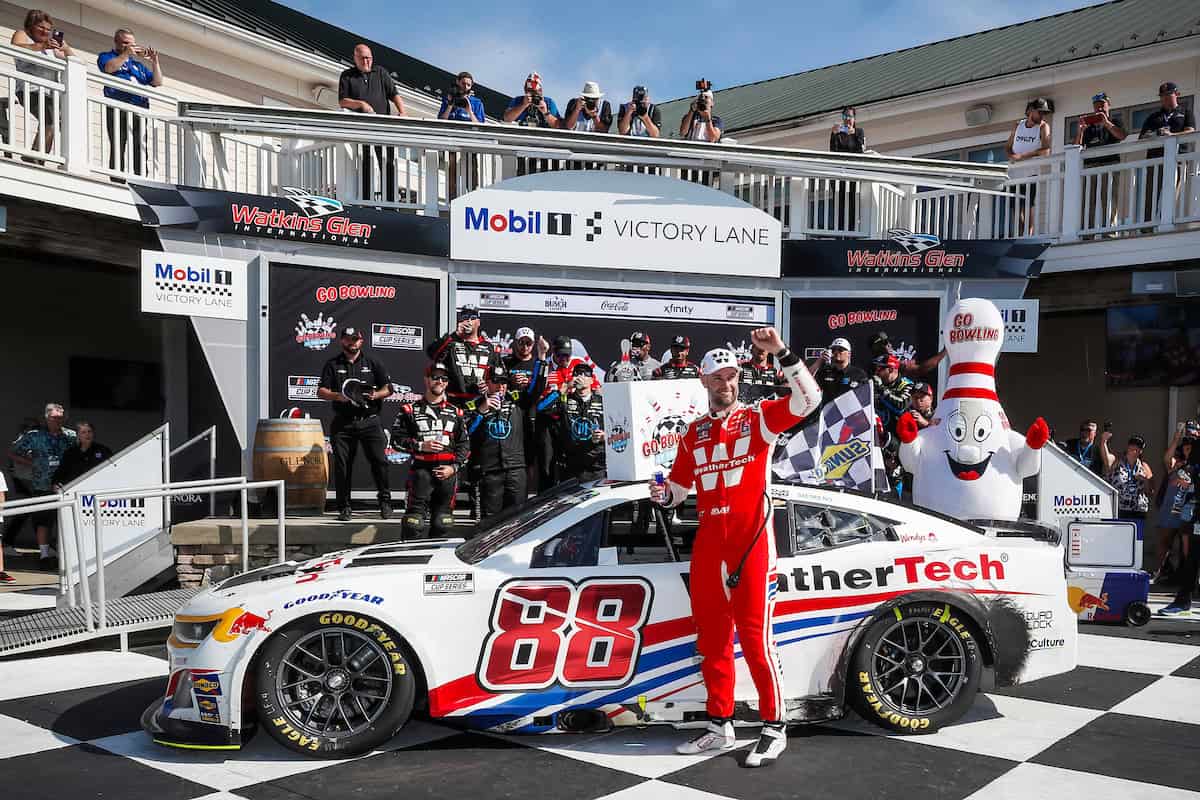Lo and behold, the NASCAR Cup Series playoffs are upon us.
Because the commentariat never stops talking about the playoffs once the checkered flag of the Daytona 500 waves, we can all enjoy a moment of relief in reveling that we now know who has made the hallowed 16.
Sorry, Chris Buescher, your run to 10th in the points during the regular season means nothing, and you will now be relegated to being cannon fodder for those on a playoff quest.
A quick side note: our writers debated whether or not the season is a failure if one does not make the playoffs. But I couldn’t be bothered with contributing to that one because, 1) I’m so f&*^ing jazzed about the playoffs, and 2) short answer, total failure. A team might as well paint a big L on the windshield for the final 10 races to ensure that everyone recognizes their lamentable status.
While the existential debate rages on regarding the playoffs, with Joey Logano (who’s made a career at this point of playing the system, a la Jimmie Johnson) arguing for their continued livelihood, that discussion feels like an annual argument that feels as stale as a Cup Series schedule from 2018.
Maybe the question should be whether or not we should have a regular season at this point.
We’ve gotten to a point where even the regular season gets vilified for various reasons. Like, Chase Briscoe won at Pocono Raceway or something. His only win of the season. But there’s no track like Pocono during the playoffs, unless you count New Hampshire Motor Speedway – both tracks out there in the woods that people begrudgingly attend once a year.
Or there’s that Austin Cindric driver, who may or may not look like Briscoe, because who knows, and they’re not in victory circle enough to distinguish them by anything other than their firesuits. Anyway, he won at Talladega Superspeedway. Groovy. Crapshoot wins are definitely big for the Chase — err, playoffs.
But if we’re going to shit on drivers snatching flukey wins that allow them to put a W on their windshield and drive without zero chance of making the playoff finales, then the derision toward Shane van Gisbergen feels real. Poor soul won only four road course races, which means nothing. See, there’s no point to the regular season!
The fact that last weekend’s race at Daytona drove its way into disaster by eliminating half of the field before the first stage break highlights the whole point.
How can we judge anything when even the cut-off race gets cut down by driver insanity in the first third? All of this is to remind ourselves that the whole thing is a contrived experiment in entertainment.
We did an exercise in my class this week to define sport(s) and filled the board. One of the comments we picked apart was the notion of entertainment. The challenge with entertainment is checking to ensure that the goods match the taste.
In NASCAR, anyone who follows the sport is aware of the generational divide and the perceptions that rest in that issue. This element brings a challenge to every sport and serves as a reminder that the next generation develops different sensibilities. Bridging these perspectives rarely goes smoothly. Let’s look at baseball, for example.
In the late 1800s/early 1900s, baseball held the public’s attention because of its unique sense of being American, while being the first sport to cement itself as a professional spectacle. One of its major selling points rested on speed. People considered the game to be fast. And in a time before HDTV, the theater of baseball appeared easy to follow as the distance between players allowed people to see the dramatic feats.
But as football made changes from its Flying V formations and opened up the passing game, it began to rival baseball’s spectacle. After WWII, baseball did not seem to be as fast as it had been before. Changes in modernity, faster air travel, the TV, the rotary phone, safer faster cars, shifted the ideology of speed. Baseball made attempts to remain entertaining, playing with the pitcher’s mound, using different colored balls at night at one point and toying with elements that could help sell the sport anew.
The advent of the pitching clock has been the one that has brought baseball toward the newer generation, one that digests the world in 30-second reels and constantly seeks a dopamine hit. The sport of NASCAR has been seeking its pitch clock ever since Matt Kenseth won only one race on his way to a championship back in 2003.
The playoffs were thought to be the pitch clock, but have not proven to be so.
Maybe shortening the races would work. Has that been discussed in focus groups? Don’t know. Those types of decisions are left to people who work within the sport and supposedly know more than I ever will.
The one surprise that got me, however, was how many of my students follow F1.
This trend continues to evince itself with one student even wearing Mercedes team gear to class. When I mentioned NASCAR in one of my classes, the vacant look said it all. But what do college kids know, right?
As a writer and editor, Ava anchors the Formula 1 coverage for the site, while working through many of its biggest columns. Ava earned a Masters in Sports Studies at UGA and a PhD in American Studies from UH-Mānoa. Her dissertation Chased Women, NASCAR Dads, and Southern Inhospitality: How NASCAR Exports The South is in the process of becoming a book.





